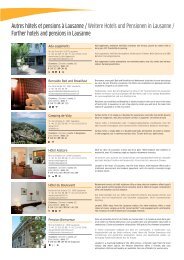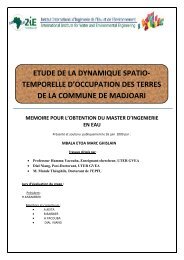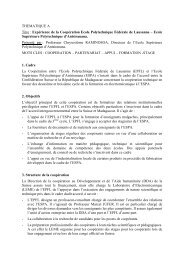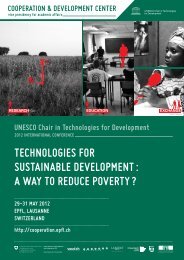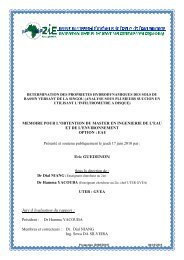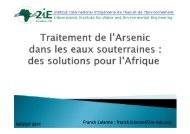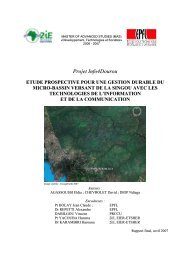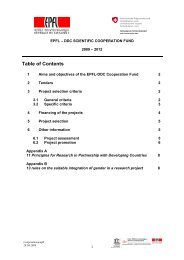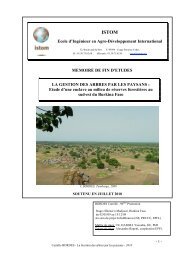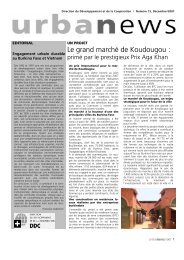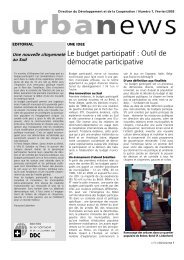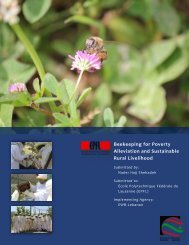TEChNOLOgIES FOR SuSTAINABLE DEVELOPMENT : A WAy TO ...
TEChNOLOgIES FOR SuSTAINABLE DEVELOPMENT : A WAy TO ...
TEChNOLOgIES FOR SuSTAINABLE DEVELOPMENT : A WAy TO ...
You also want an ePaper? Increase the reach of your titles
YUMPU automatically turns print PDFs into web optimized ePapers that Google loves.
2012 EPFL- UNESCO Conference on Technologies for Development | 93Abstract: Use of wood and charcoal for cooking is a major cause of increasing deforestation andassociated environmental problems worldwide. Apart from low fuel efficiency, the traditionalstove designs, cooking culture and architectural custom also contribute to indoor air pollution,which is considered as one of the leading health problem in developing countries for women andyoung children and a contributing factor to global warming. However, modern alternatives likeLPG/Kerosene are riddled with other problems such as cost, safety and lack of infrastructure inremote areas. Therefore, it is essential to introduce sustainable fuel supply made from localresources along with improved biomass stoves, with high fuel use efficiency and as competitiveemissions as of LPG. The gasifier stoves built on the principle of biomass gasification, meet theserequirements and also produce biochar, which can provide income as well as an excellent soilamendment for the users. However, the use of these stoves with sustainable fuel supply is verylimited at present and field studies are required to develop profitable business models of gasifierstoves and cooking fuel to identify potential problems and solutions for encouraging wideracceptance of these stoves. Most of the stove programs promote the use of efficient cook stovesbut there is a need of sustainable and profitable business model to couple the availability ofcooking fuel along with gasifier stoves.In this research paper, the approach of Inyenyeri business model sustainability in Rwanda toreach its customers are discussed along with the use of fuel pellets as a cooking energy. Inyenyeribusiness model is first of its kind to use crowdsourcing for pellets generation and gasifier stovewith the biochar generation in the field of stove programs. The focus of the research is on thesocial innovation done by Inyenyeri with the aim of energy poverty alleviation, which is claimed tobe much more than just providing clean cooking energy by the company.Keywords: Gasifier stoves, pellets, Rwanda, social business, poverty alleviation14:00-16:00 Human Settlement Room Polyvalente14:00-14:20 [354] Spelling Space: Exploring Ideal Types for Concept Formation inInternational Architecture ProjectsIsabella Pasqualini 1 , Riccardo Bonazzi 2 , Tu Shan 31Ecole Polytechnique Fédérale de Lausanne, Lausanne, Switzerland2Université de Lausanne, Lausanne, Switzerland3Tsinghua University, Beijing, ChinaPresenting author’s email address: isabella.pasqualini@epfl.chBiography of presenting author: Isabella Pasqualini is an architect, researcher and urbanist.Beyond authoring prize awarded competition projects and visions her works were selected for theSwiss Art Awards 2008 and 2010. Currently a PhD student at the École Polytechnique Fédérale deLausanne in collaboration with the Laboratory of Cognitive Neuroscience she investigates theperception of architectonic space while also engaging in projects ranging from multisensory artinstallations to a design summer school at the Tsinghua University in Beijing.Abstract: The cultural dimension is known to be crucial for the introduction of architectonic andurbanistic standards into countries with emerging economies. Particularly, the recent presence ofdigital media and tools has incremented the easy assimilation of Western standards. From thearchitect’s point of view this represents a problematic trend, not only leading to conflictualsituations during the development and construction process, but also to conceptual failurescaused by insufficient consideration of local values and know-how. In this paper, we proposenovel ways to conceive solutions for international development projects by involving on the onehand recurrent criteria, but on the other also by exploring and fostering local values andmanufacture skills.We ground our approach onto existing models of theory building by implementing typologies orideal types as elements of concept formation in the architectonic design process. Using a recentcase study in China we will illustrate the application of such an ideal type. In the case study wedescribe how within a Sino-Swiss academic environment we have co-authored a project-specificarchitectonic language through the use of a commonly generated ontology by consideringenvironmental and cultural issues. Great emphasis has been laid on a mutual learning effect andthe involvement of a development process related to crafting prototypes. This approach hasallowed us to address issues of environmental sustainability at a very early and high-levelconceptual stage by involving and developing conceptual skills borne from local needs andpotentials. Together with our partner we have tried to balance arguments stemming from the



